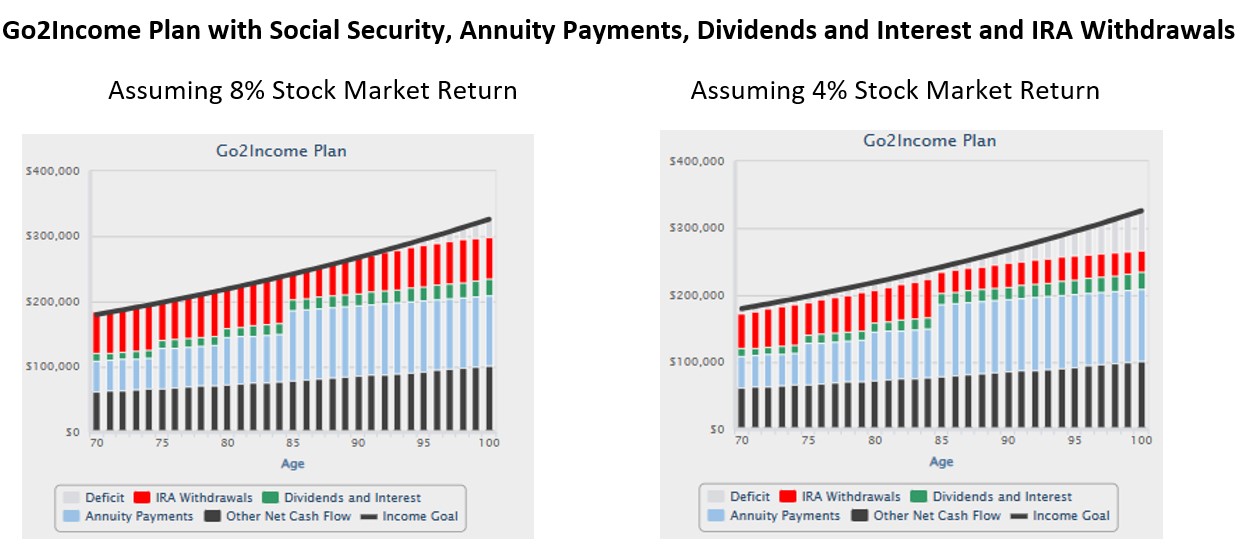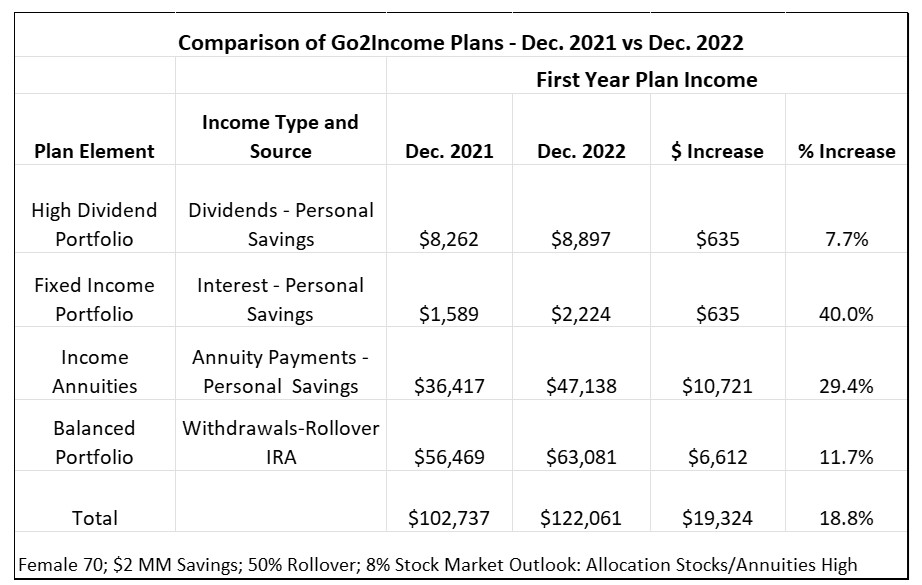Even After a Year Like 2022, Your Retirement Income Plan Can Stay on Course
Predictions about what the markets will do or how the economy will perform are often wrong. That’s why it’s better to “prepare” rather than “predict,” and that requires establishing some basic assumptions.


Profit and prosper with the best of Kiplinger's advice on investing, taxes, retirement, personal finance and much more. Delivered daily. Enter your email in the box and click Sign Me Up.
You are now subscribed
Your newsletter sign-up was successful
Want to add more newsletters?

Delivered daily
Kiplinger Today
Profit and prosper with the best of Kiplinger's advice on investing, taxes, retirement, personal finance and much more delivered daily. Smart money moves start here.

Sent five days a week
Kiplinger A Step Ahead
Get practical help to make better financial decisions in your everyday life, from spending to savings on top deals.

Delivered daily
Kiplinger Closing Bell
Get today's biggest financial and investing headlines delivered to your inbox every day the U.S. stock market is open.

Sent twice a week
Kiplinger Adviser Intel
Financial pros across the country share best practices and fresh tactics to preserve and grow your wealth.

Delivered weekly
Kiplinger Tax Tips
Trim your federal and state tax bills with practical tax-planning and tax-cutting strategies.

Sent twice a week
Kiplinger Retirement Tips
Your twice-a-week guide to planning and enjoying a financially secure and richly rewarding retirement

Sent bimonthly.
Kiplinger Adviser Angle
Insights for advisers, wealth managers and other financial professionals.

Sent twice a week
Kiplinger Investing Weekly
Your twice-a-week roundup of promising stocks, funds, companies and industries you should consider, ones you should avoid, and why.

Sent weekly for six weeks
Kiplinger Invest for Retirement
Your step-by-step six-part series on how to invest for retirement, from devising a successful strategy to exactly which investments to choose.
A good plan for retirement income relies on assumptions about future economic results like stock market performance, interest and dividend yields and inflation. In case you were wondering, sometimes assumptions run off the tracks. Just to confirm my theory, I scrolled back to December 2021 for the predictions for 2022.
Prediction: The Dow Jones will reach 38,000 for the first time.
What happened: The Dow hit its market-close high of 36,799 on Jan. 4, went as low as 28,725 on Sept. 30 and lately has been bouncing between 32,000 and 35,000.
From just $107.88 $24.99 for Kiplinger Personal Finance
Become a smarter, better informed investor. Subscribe from just $107.88 $24.99, plus get up to 4 Special Issues

Sign up for Kiplinger’s Free Newsletters
Profit and prosper with the best of expert advice on investing, taxes, retirement, personal finance and more - straight to your e-mail.
Profit and prosper with the best of expert advice - straight to your e-mail.
Prediction: The market will get a handle on inflation, with a “manageable rise” of 2% to 3%.
What happened: Inflation is considered now “under control” — at 7.1% for the year ending November 2022.
Prediction: The Fed will not raise rates significantly.
What happened: In December, the Fed raised rates for the seventh time this year.
Jeff Sommer, a financial columnist for The New York Times, made a similar point about market forecasts: “No doubt, enormous changes that aren’t visible yet are coming in 2023. Inflation and interest rates preoccupy financial markets now, but there is no assurance that will be the case a year from now.”
I agree with him. That’s why Go2Income doesn’t predict but does prepare you for the future.
In this article, I’m going to focus on how to get comfortable about the assumptions underlying your plan. We’ll be looking at the changes to the Go2Income planning model just made on Dec. 1. Importantly, you will also see how to stay the course even after a year like 2022.
What You Need to Understand About Assumptions
Even if you studied English instead of economics, you can learn how to plan for your financial future. When designing a plan for your retirement future, you should understand the following:
- Which market assumptions are being used in your retirement income planning model, and how do they impact your plan in terms of income, liquidity and legacy?
- How the volatility in the market impacts your plan, and the plan adjustments you can make in response. (And specifically, how much of your income is subject to market volatility.)
- The ways that a plan primarily based on withdrawals and resultant sale of securities could also cause you to underperform the market — through not being in the market at the right times.
Let’s look at how assumptions might affect your income.
Picking Assumptions Regarding Stock Market Returns
For our typical investor invested in a Go2Income plan representing a combination of Social Security, annuity payments, interest and dividends and IRA withdrawals, only 20% to 25% of her planned income is subject to market volatility. The graphs below show a projection of her plan income assuming an 8% long-term stock market return vs. a 4% stock market return.

Assumptions are critical in your planning. As you see, a 4% return provides lower income for 25 years. But you can also tell that it’s not catastrophic — because so much of our Go2Income investor’s income is “safe,” coming mainly from sources other than IRA withdrawals.
What Stock Market Returns Should You Assume in Designing Your Plan?
Most investors are aware of the risks of investing in the stock market – and the rewards. Besides the actual market returns, there is also a risk of your bailing out of a well-constructed plan just because the latest market results look bad. Let’s look at how the stock market has performed over 10-, 20- and 30-year periods as measured by the S&P 500 index.

In the Go2Income planning model, our default assumption is 8% (after asset management fees and before adviser fees). An adviser can assume between 3% and 9% in his planning. Of course, the only type of portfolio used in planning for the riskier IRA withdrawals is a balanced portfolio of equities and fixed income.
How to Select Market Assumptions Regarding Fixed-Income Portfolio and Dividend Yields
In a Go2Income model, we review the fixed-income market assumptions at least quarterly; annuity rates are reviewed monthly. Assumptions related to fixed-income and dividend yields are set by us; others, like stock market outlook and inflation rate, can be set by your adviser after consultation with you. In addition, assumptions selected or recommended by an adviser will be influenced by the design of the plan, particularly the allocation to equities and annuities.
After reviewing the data and consulting with FolioBeyond, we made the following changes in the Go2Income model effective on Dec. 1.
- Dividend yield: Increased from 3.25% to 3.5%.
- Interest yield: Increased from 2.5% to 3.5%.
- Total return on fixed income: Increased from 3.5% to 4.5%.
While not an assumption per se, we determined that, on average, annuity payment contracts were being credited with a lifetime interest rate of 5.25% as of Dec 1. Some were higher; others were lower. Of course, you’ll be able to select the company with the best rates when you implement a plan. To get a quote based on current rates, complete the widget on our welcome page.
And What About Inflation?
With the investment assumptions in place, we need to select assumptions as to long-term inflation.
Here are the results over the past 30 years of the Consumer Price Index (CPI), looking at all 10-year and 20-year periods using the compound rate of inflation over the period.

Despite 2022, the median long-term inflation rate still hovers around 2.75%. Our default assumption for the future continues to be 2%, but with your income goal adjusted for recent inflation. Of course, you and your adviser can select your own assumption as to inflation, recognizing your Social Security benefits will track inflation. Inflation is another example of adjusting your current income goal in real time but making sure your long-term assumptions are neither too aggressive nor too conservative.
Finally, What Did the Updated Assumptions Do to My Plan Income?
With the plan assumptions in place and with the allocation by income source unchanged, we can create your December 2022 plan and compare it to one from a year ago. So, the new plan is generating plan income that is nearly 19% higher, and if your market losses were 20% or less, you are whole.

But Do You Implement Now?
This end-of-the-year article is meant to help you think about your plan for retirement income — with updates to reflect current market assumptions. But do you implement now? Do you implement in part with, say, the rollover IRA portion only? Do you purchase the annuities in one or both accounts? Or maybe the investment portfolios?
One thing to definitely include on your to-do list: Re-evaluate your plan at the end of 2023.
My January 2023 article will offer information to help you act on your assumptions and execute a plan personalized to best benefit you and your family.
Get the numbers for your own retirement. Visit Go2Income, answer a few simple questions and start working on your own retirement plan. This service is a complement to our other services, and you can ask for a Go2Specialist to help answer your questions on planning. We also have advisers available who can help with the next steps to refine and then implement your plan.
Profit and prosper with the best of Kiplinger's advice on investing, taxes, retirement, personal finance and much more. Delivered daily. Enter your email in the box and click Sign Me Up.

Jerry Golden is the founder and CEO of Golden Retirement Advisors Inc. He specializes in helping consumers create retirement plans that provide income that cannot be outlived. Find out more at Go2income.com, where consumers can explore all types of income annuity options, anonymously and at no cost.
-
 Nasdaq Leads a Rocky Risk-On Rally: Stock Market Today
Nasdaq Leads a Rocky Risk-On Rally: Stock Market TodayAnother worrying bout of late-session weakness couldn't take down the main equity indexes on Wednesday.
-
 Quiz: Do You Know How to Avoid the "Medigap Trap?"
Quiz: Do You Know How to Avoid the "Medigap Trap?"Quiz Test your basic knowledge of the "Medigap Trap" in our quick quiz.
-
 5 Top Tax-Efficient Mutual Funds for Smarter Investing
5 Top Tax-Efficient Mutual Funds for Smarter InvestingMutual funds are many things, but "tax-friendly" usually isn't one of them. These are the exceptions.
-
 Nasdaq Leads a Rocky Risk-On Rally: Stock Market Today
Nasdaq Leads a Rocky Risk-On Rally: Stock Market TodayAnother worrying bout of late-session weakness couldn't take down the main equity indexes on Wednesday.
-
 Social Security Break-Even Math Is Helpful, But Don't Let It Dictate When You'll File
Social Security Break-Even Math Is Helpful, But Don't Let It Dictate When You'll FileYour Social Security break-even age tells you how long you'd need to live for delaying to pay off, but shouldn't be the sole basis for deciding when to claim.
-
 I'm an Opportunity Zone Pro: This Is How to Deliver Roth-Like Tax-Free Growth (Without Contribution Limits)
I'm an Opportunity Zone Pro: This Is How to Deliver Roth-Like Tax-Free Growth (Without Contribution Limits)Investors who combine Roth IRAs, the gold standard of tax-free savings, with qualified opportunity funds could enjoy decades of tax-free growth.
-
 One of the Most Powerful Wealth-Building Moves a Woman Can Make: A Midcareer Pivot
One of the Most Powerful Wealth-Building Moves a Woman Can Make: A Midcareer PivotIf it feels like you can't sustain what you're doing for the next 20 years, it's time for an honest look at what's draining you and what energizes you.
-
 Stocks Make More Big Up and Down Moves: Stock Market Today
Stocks Make More Big Up and Down Moves: Stock Market TodayThe impact of revolutionary technology has replaced world-changing trade policy as the major variable for markets, with mixed results for sectors and stocks.
-
 I'm a Wealth Adviser Obsessed With Mahjong: Here Are 8 Ways It Can Teach Us How to Manage Our Money
I'm a Wealth Adviser Obsessed With Mahjong: Here Are 8 Ways It Can Teach Us How to Manage Our MoneyThis increasingly popular Chinese game can teach us not only how to help manage our money but also how important it is to connect with other people.
-
 Looking for a Financial Book That Won't Put Your Young Adult to Sleep? This One Makes 'Cents'
Looking for a Financial Book That Won't Put Your Young Adult to Sleep? This One Makes 'Cents'"Wealth Your Way" by Cosmo DeStefano offers a highly accessible guide for young adults and their parents on building wealth through simple, consistent habits.
-
 Global Uncertainty Has Investors Running Scared: This Is How Advisers Can Reassure Them
Global Uncertainty Has Investors Running Scared: This Is How Advisers Can Reassure ThemHow can advisers reassure clients nervous about their plans in an increasingly complex and rapidly changing world? This conversational framework provides the key.